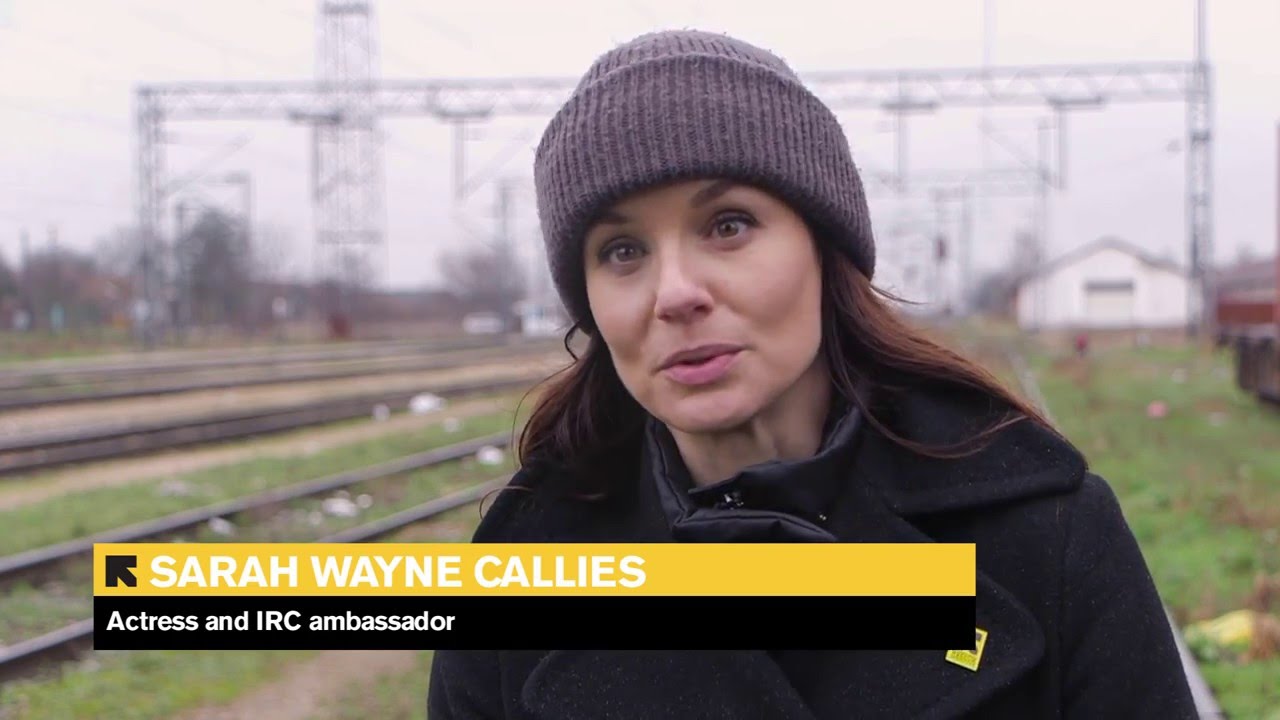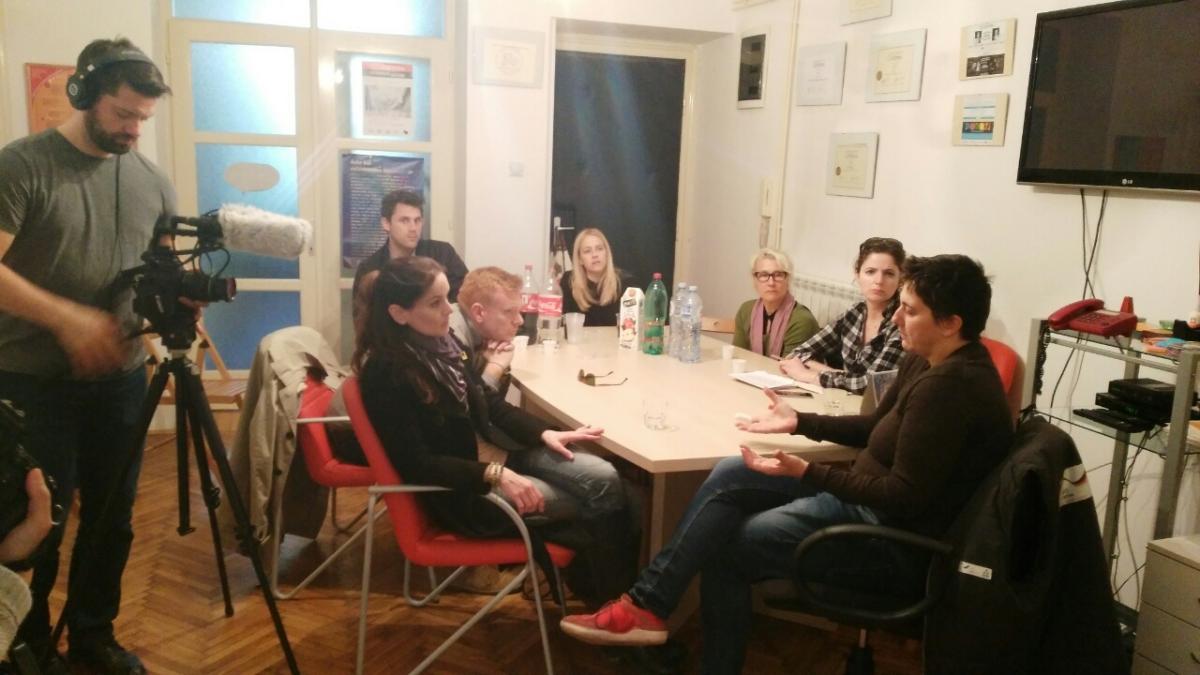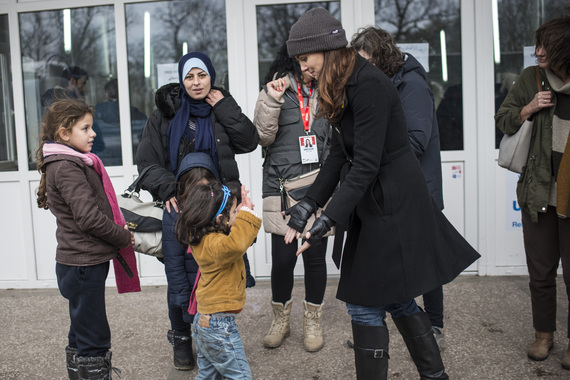Hotline: +381 61 63 84 071
Making Constellations Out of Stars: the IRC in Serbia

In the last few days I have met a new phalanx of Heroes. Traveling through Serbia with the International Rescue Committee, we followed the refugee route from Presevo (Macedonian border) to Belgrade and up to Sid (Croatian border). Along the way I met with the partners of the IRC aid network - in my experience with international aid (which is admittedly neither unbiased nor vast) a new paradigm has evolved in Serbia due partly to the ingenuity of the IRC leadership teams and partly due to Serbia's unique history.
Rather than arriving on the ground in the midst of the worst humanitarian crisis since the Yugoslav wars and setting up independent operations, the IRC has partnered with existing local NGOs to convene a network of indigenous aid. IRC staff mined the country for home-grown aid organizations and then established themselves as a clearinghouse of support - financial, organizational development, psychosocial, etc. -for these enterprises. It has also sought to strengthen connections between these NGOs for mentorship, case referrals, and information sharing. The effect is that - rather than asserting an aid-imperialism (we are here to give you what we think you need) or a culture of dependency (we are your only source of help) - the IRC is empowering a Serbian aid network that will continue to nourish and sustain the country long after (inshallah) the flow of refugees from Syria, Iraq, Afghanistan, and other war-torn countries has ended.
These are the people in the neighborhood:
The Rock Star: Valon (Founder and Director, Youth for Refugees)
Valon was walking me through the Presevo refugee check point: an abandoned tobacco factory beside the train tracks just across the border from Macedonia. A gorgeous young woman rounded a corner, broke into a huge grin, and threw herself into his arms. He embraced her, made her laugh, and left with a smile. Valon has that effect on people - a natural leader, easygoing and charming even though he hasn't had a full night's sleep in months.
Valon is the founder of Youth for Refugees. He started the group - made up of young volunteers, some of whom work service jobs to support the time they donate - after seeing some refugees sleeping in the rain near his house. He wondered why the government and the churches weren't sheltering them - but rather than waiting on someone else to attend to the problem, he found homes for them that night among people in his community.
The economics of this generosity are worth mentioning: Serbia is not a rich country. Many of the Syrian refugees had - before their country was torn to pieces and they were targeted with unthinkable violence - a much higher standard of living than the average Serbian. Valon and his friends are reaching out to help a population who has been, until a few years ago, far more privileged than they themselves are likely ever to be. And as anyone knows who has worked in food service, that requires a grace and largesse that impress me all the more.
But Valon and his volunteers didn't stop with housing people. He did something very smart: he talked to the refugees and found out what they need. The answer was twofold: information and dignity. So in collaboration with the IRC and another local NGO, Info Park, he also set up an information kiosk at the train station where refugees could get vital information: when did the trains leave, what did they cost, what about busses, where were they going to next?
And then, with IRC support, Valon also opened a coffee shop with a barbershop next door. They are small affairs, you can cross them in a couple of steps and until more decorations show up their plywood walls are humble. So far the coffee is instant but there is a small deck with some patio furniture and a plastic playground for children. The impact of this small, humane, and peaceful space almost defies description.
I will put it this way: I spoke with a Syrian family from Homs who had finally fled after the destruction and violence became intolerable. For two years they had lived a five minute drive from their elderly mother and they had not been able to visit her once because of the fighting in the streets. For a population that have had no access to salt and sugar for years to sit in a clean café and be treated like human beings, offers incalculable balm to souls who have suffered beyond the imagination.
Now, the million dollar question: why is Valon doing it? What roots in the hearts of a couple dozen twenty-somethings so deeply that they devote their lives to servicing a community they do not know? These kids were refugees themselves during the breakup of Yugoslavia in the 1990's. One of them described being thrown over a wall by his father into the hands of relative so that he would be safe. Another told me he and his family walked dozens of miles across the mountains to reach safety. They know what it is to be powerless, afraid and in danger. And they know the deep roots of gratitude and compassion that infuse your life forever afterwards; they are living proof of it. It made me wonder - if the world community were to unite around the refugees from Syria, Iraq and Afghanistan, what spectacular undertakings of compassion and humanity would their children enact to make us all proud?
The Goddess: Marijana (Director, Atina)
Full disclosure: I have a crush on this woman. I defy any one who spends an hour with her not to have one too. For starters, knowing the conversation would be painful, she offered me a glass of her home-make Rakija, a pear flavored Serbian brandy - it was both sensational and deceptively strong. But more than that, Marijana is a warrior, and you get the sense that, like Athena for whom her organization is named, she sprung fully armed from a great mind.
Whereas Youth for Refugees is a new organization, Marijana and the coterie of brilliant women at Atina have been doing their work for over a dozen years: the work of advocating for and providing services to vulnerable women and children. They worked initially with victims of the wars following the breakup of Yugoslavia, learning their trade with women who sometimes remain a part of their organization for seven years - no one is given up on or left behind at Atina. This is an office of women who understand the complexities of healing from GBV (gender-based violence) and the atrocities committed against the most vulnerable members of the war and the flight from it: women and children traveling alone. The Atina women go to train stations, bus station, aid centers and parks seeking out women and children who have suffered the unspeakable acts of degradation and violation that they are often afraid to share with their own families. "We need to raise a generation of men who think of rape like cannibalism," Marijana says as she recalls the stories she's heard.
We discuss how hard it is for women and children to open up about sexual assault, and I don't say it out loud because it seems silly to cry in front of a woman who has seen so much worse, but I think about the dozen years it took me to speak about my own sexual assault. It's then I realize that Atina is a first step in a long journey for many women and children who will arrive Germany or Austria or France - somewhere safe at last - and only then begin to face the capricious and challenging process of reclaiming yourself after GBV. What Marijana teaches me is that our aid must be ongoing - we need to build networks so that women who open up to Atina are placed in good hands when they land in their new home. We need to connect stars like Atina with similar organizations throughout Europe so that they can form a kind of Underground Railroad to guide our sisters to wholeness again.

The Goddess: Marijana (Director, Atina)
Full disclosure: I have a crush on this woman. I defy any one who spends an hour with her not to have one too. For starters, knowing the conversation would be painful, she offered me a glass of her home-make Rakija, a pear flavored Serbian brandy - it was both sensational and deceptively strong. But more than that, Marijana is a warrior, and you get the sense that, like Athena for whom her organization is named, she sprung fully armed from a great mind.
Whereas Youth for Refugees is a new organization, Marijana and the coterie of brilliant women at Atina have been doing their work for over a dozen years: the work of advocating for and providing services to vulnerable women and children. They worked initially with victims of the wars following the breakup of Yugoslavia, learning their trade with women who sometimes remain a part of their organization for seven years - no one is given up on or left behind at Atina. This is an office of women who understand the complexities of healing from GBV (gender-based violence) and the atrocities committed against the most vulnerable members of the war and the flight from it: women and children traveling alone. The Atina women go to train stations, bus station, aid centers and parks seeking out women and children who have suffered the unspeakable acts of degradation and violation that they are often afraid to share with their own families. "We need to raise a generation of men who think of rape like cannibalism," Marijana says as she recalls the stories she's heard.
We discuss how hard it is for women and children to open up about sexual assault, and I don't say it out loud because it seems silly to cry in front of a woman who has seen so much worse, but I think about the dozen years it took me to speak about my own sexual assault. It's then I realize that Atina is a first step in a long journey for many women and children who will arrive Germany or Austria or France - somewhere safe at last - and only then begin to face the capricious and challenging process of reclaiming yourself after GBV. What Marijana teaches me is that our aid must be ongoing - we need to build networks so that women who open up to Atina are placed in good hands when they land in their new home. We need to connect stars like Atina with similar organizations throughout Europe so that they can form a kind of Underground Railroad to guide our sisters to wholeness again.
The original text can be read on the follow link:
http://www.huffingtonpost.com/sarah-wayne-callies/making-constellations-...













 FACEBOOK
FACEBOOK TWITTER
TWITTER YOUTUBE
YOUTUBE